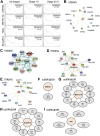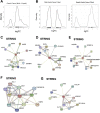Gastric Cancer Heterogeneity and Clinical Outcomes
- PMID: 32799763
- PMCID: PMC7432987
- DOI: 10.1177/1533033820935477
Gastric Cancer Heterogeneity and Clinical Outcomes
Abstract
Gastric adenocarcinoma is a highly aggressive disease with poor overall survival. The aggressive nature of this disease is in part due to the high intra and inter tumoral heterogeneity and also due to the late diagnosis at presentation. Once progression occurs, treatment is more difficult due to the adaptation of tumors, which acquires resistance to commonly used chemotherapeutics. In this report, using publicly available data sets and pathway analysis, we highlight the vast heterogeneity of gastric cancer by investigating genes found to be significantly perturbed. We found several upregulated genes in the diffuse gastric cancer subtypes share similarity to gastric cancer as a whole which can be explained by the increase in this subtype of gastric cancer throughout the world. We report significant downregulation of genes that are underrepresented within the literature, such as ADH7, GCNT2, and LIF1, while other genes have not been explored within gastric cancer to the best of our knowledge such as METTL7A, MAL, CWD43, and SLC2A12. We identified gender to be another heterogeneous component of this disease and suggested targeted treatment strategies specific to this heterogeneity. In this study, we provide an in-depth exploration of the molecular landscape of gastric cancer in order to shed light onto novel areas of gastric cancer research and explore potential new therapeutic targets.
Keywords: classification; differential gene expression; gastric cancer; microRNA; oncomine.
Conflict of interest statement
Figures



References
-
- Bang YJ, Xu RH, Chin K, et al. Olaparib in combination with paclitaxel in patients with advanced gastric cancer who have progressed following first line therapy (GOLD): a double-blind, randomized, placebo controlled, phase 3 trial. Oncology. 2017;18(12):1637–1651. - PubMed
-
- Lv S, Wang Y, Sun T, et al. Overall survival benefit from trastuzumab-based treatment in HER2-positive metastatic breast cancer: a retrospective analysis. Oncol Res Treat. 2018;41(7-8) 450–455. - PubMed
Publication types
MeSH terms
Substances
LinkOut - more resources
Full Text Sources
Medical
Research Materials
Miscellaneous

